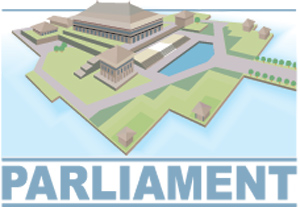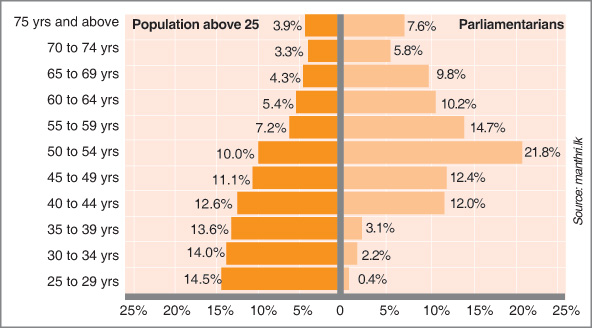Columns
JHU, NFF ‘show’ of ‘No Confidence’ sours Govt. victory
View(s):By Chandani Kirinde - Lobby Correspondent
For a government that enjoys a two-thirds majority in Parliament, its inability to get the support of two of its constituent parties to vote against a no-confidence motion brought by the main opposition UNP, cannot be considered a big blow. However, the show of dissent, even in a small way, does indicate that, even the most invincible-looking administration can lose its aura, when it begins to put personal interest over the interests of the public, and make ‘life’ uncomfortable for at least some within the Government.
 Given the fact, that the no-confidence motion was centered on the inability of the Government to crack down effectively on the growing drug trade in the country, the Jathika Hela Urumaya (JHU) had a moral stance to defend, given its broadside on the alleged link of a member of the Prime Minister’s staff, to a massive drug haul. Hence, the decision of the two JHU MPs, Minister Champika Ranawaka and Ven. Aturaliye Ratana Thera to keep away from the House during the vote on Wednesday, did not come as a surprise.
Given the fact, that the no-confidence motion was centered on the inability of the Government to crack down effectively on the growing drug trade in the country, the Jathika Hela Urumaya (JHU) had a moral stance to defend, given its broadside on the alleged link of a member of the Prime Minister’s staff, to a massive drug haul. Hence, the decision of the two JHU MPs, Minister Champika Ranawaka and Ven. Aturaliye Ratana Thera to keep away from the House during the vote on Wednesday, did not come as a surprise.
On the other hand, as to the real reason why National Freedom Front (NFF) members, Minister Wimal Weerawansa and fellow MP Weerakumara Dissanayake kept away is not clear, even though, outside the Chamber, the NFF said it was dissatisfied with the way the Government is tackling the drug issue.
Their absence from the House, at the time of voting, however, does raise the question as to how the JHU and the NFF can remain members of an Alliance in which they have no confidence, and also, how serious they are about taking the administration to task. For now it appears that, both the JHU and the NFF only want to test the water by wading in a little, but not taking a plunge that would lead them to sever ties altogether with this administration.
These minor rumblings really did not matter at the time of voting, as the Sri Lanka Freedom Party (SLFP)-led United People’s Freedom Alliance (UPFA) mustered the necessary numbers to defeat the motion, 151 to 57 that a joint Opposition including the UNP, JVP and Tamil National Alliance (TNA) together managed to put together.
The no-confidence motion signed by 26 UNP MPs, was based on the Government‘s inability to tackle the increasing proliferation of dangerous drugs in the local market, making specific reference to the alleged involvement of the Prime Minister’s Coordinating Secretary who had, in August last year, issued a letter to the Customs, requesting the release of a container which turned out to contain narcotic drugs. The motion also referred to Kumaran Pathmanathan alias KP’s the link to drug smuggling.
The motion was moved by UNP Gampaha District MP Joseph Michael Perera and seconded by Colombo District MP Ravi Karunanayaka.
Both members alleged that the Government was not effectively tackling the growing drug trade within the country, and that, while small time dealers were being apprehended, the big fish were getting way.“KP is getting State patronage when he is wanted by Interpol for drug smuggling,” Mr Karunanayaka said.
UNP Kegalle District MP Kabeer Hasheem said, large scale availability of drugs in the country is more dangerous than terrorism. “The Mahinda Chinthana preaches something quite opposite to what the Government does,” he said.
UNP Hambantota District MP Sajith Premadasa said, a government that managed to eliminate the most dangerous terrorist group in the world, has failed to take the same interest in cracking down on drug dealers. “We can use the military and our intelligence services to tackle this problem, but the Government has failed to do this. Instead, it is using the military for cattle herding, landscape beautification and to stack sand bags for car races,” he said.
Several Government MPs argued that the drug problem in the country began to surface with the open economic policies introduced by the UNP in 1977. “When the UNP Government amended the Poisons, Opium and Dangerous Drugs Ordinance in 1984, it was mentioned that Sri Lanka had by then become a transit point for the smuggling of drugs. So we can see this is not something that happened under this administration,” said Prisons and Prison Reforms Minister, Chandrasiri Gajadeera.
TNA MPs said that the Tamil people face many issues other than a drug problem. “The Tamil people are denied their right to mourn their dead today,”said Jaffna District MP Suresh Premachandran.
The JVP, which also supported the Motion, did not seem altogether satisfied with the manner in which it was framed. “The people have lost confidence in this Government, not only because of the drug issue, but over its inability to maintain law and order, protect human rights and control the cost of living. These are issues which should have been included in the No-Confidence motion,” said JVP MP Anura Kumara Dissanayaka. All in all, the no-confidence motion was a minor test for the Government, but it would be a good time for those in key places within the administration to take stock of where exactly it’s heading of late, because what begins as a small leak can lead to a deluge, as Sri Lanka’s political history has shown many a time.
Half the Parliament will be over 65 in the next 15 years

The left side of the graphic illustrates those in a given age group, as a percentage of population over 25 years old. The right side illustrates the percentage of parliamentarians in each age group, as derived from Manthri.lk.
It is well known that Sri Lanka has an ageing population; that is, the percentage of people above retirement age is increasing rapidly. It can now be revealed that the problem is more acute in Sri Lanka’s parliament. The Members of Parliament are much older compared to the eligible general population, and, what’s more – they are ageing faster!
Data from Manthri.lk, a pioneering trilingual website profiling parliamentary activities, shows the extent of the problem. Aged Parliamentarians: In the current parliament, the oldest MP is aged 86 and the youngest is aged 27. Suppose then that 25 years is a minimum feasible age for entering parliament. In the general population only 11.5% of those above 25 years are also above the age of 65. However, that figure is doubled – at 23% – in the Sri Lankan parliament.
In the age-groups between 40 and 50, the percentage in parliament closely fits the percentage in the population. But in every age-group above 50 years, the percentage in parliament is about double the percentage in the eligible general population.

